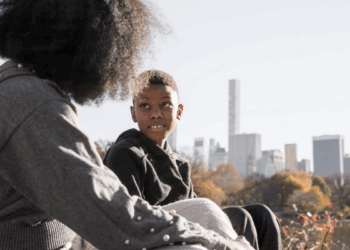It is no secret that the Coronavirus, (COVID-19), pandemic and social distancing measures have taken an emotional toll on not only adults, but on children as well. Many schools have shifted from full days on campus to online learning, playdates have been cancelled, after school activities and sports have been halted, the list goes on. Adults are anxious, overwhelmed, and concerned, so just imagine how this is affecting those under 18.
“None of us do well with uncertainty, and this crisis is a lot for our children to process. Just like us, our children are experiencing a great deal of loss of their normal lives right now,” said Genevieve von Lob, a psychologist and author of Happy Parent, Happy Child in an interview with Huffpost.
Von Lob also noted in the interview that, kids may be struggling with many of the sudden changes in their day-to-day existence, missing their friends and their normal routines and worrying about jobs, finances or physical health.
“When children are stressed, it is often expressed in physiological changes and changes in mood and behaviors,” said Robin Gurwitch, a Duke University psychiatry professor specializing in family and child mental health in the same interview. “Sadly, we don’t have a parenting manual that allows us to turn to Chapter 4 on children and pandemics to know what to look for in our children or even for ourselves.”
Kids don’t always verbalize, letting parents know that they are anxious, depressed or experiencing other mental health issues. They themselves may not even know. These things can manifest themselves in other ways. According to the experts, here are five indicators that parents should watch out for during this worldwide crisis.
Regressive Behaviors
Behaviors that you thought were long gone make a reappearance.
“In general, we are all going to regress a little in our functioning during this time of major transition,” said psychotherapist Noel McDermott in her interview with Huffpost. “Children are going to regress more than adults, and the younger the child, the more the regression is likely to be.”
Changes In Appetite
Keep an eye out for changes in your child’s eating behavior. Overeating or decrease in appetite can be a sign of more than just bordem.
“A child’s appetite and sleep are often the first telltale signs things are not OK,” said Natasha Daniels, a child therapist and creator of AnxiousToddlers.com said to Huffpost. “Often a child will exhibit a sharp increase or decrease in appetite.”
Sleep Issues
During difficult and uncertain times, sleep patterns can change and everyone, especially kids experience insomnia, nightmares, etc.
“Sleep can also become altered,” Daniels noted. “Pay attention if your child is sleeping all day or conversely is having a hard time falling asleep or staying asleep.”
Mood Shifts
If your child suddenly has angry outbursts, sudden bouts of crying, sullenness, irritability, loss of interest in favorite activities and isolating themselves from others, this is an indicator that something is indeed wrong.
“I advise parents to look for changes in your child’s ‘base-line’ or normal behavior,” said clinical psychologist John Mayer to Huffpost.
“Look for changes in their normal temperament or mood and keep in mind that stress brings out your normal mood-set even more,” said Craig A. Knippenberg, a therapist and author of Wired and Connected: Brain-Based Solutions To Ensure Your Child’s Social and Emotional Success, in the same interview, noting that anxious children are likely to feel more anxious, while those with anger issues may have more frequent outbursts.
We are all going through an unprecedented amount of stress and uncertainty at this time. Sit down and talk to your children about their feelings in regards to the pandemic. Make sure that you all speak openly and honestly about what everyone is feeling. Try your best to address their concerns and provide them with honest and truthful answers, while making sure that you let them know, #weareallinthistogether.







